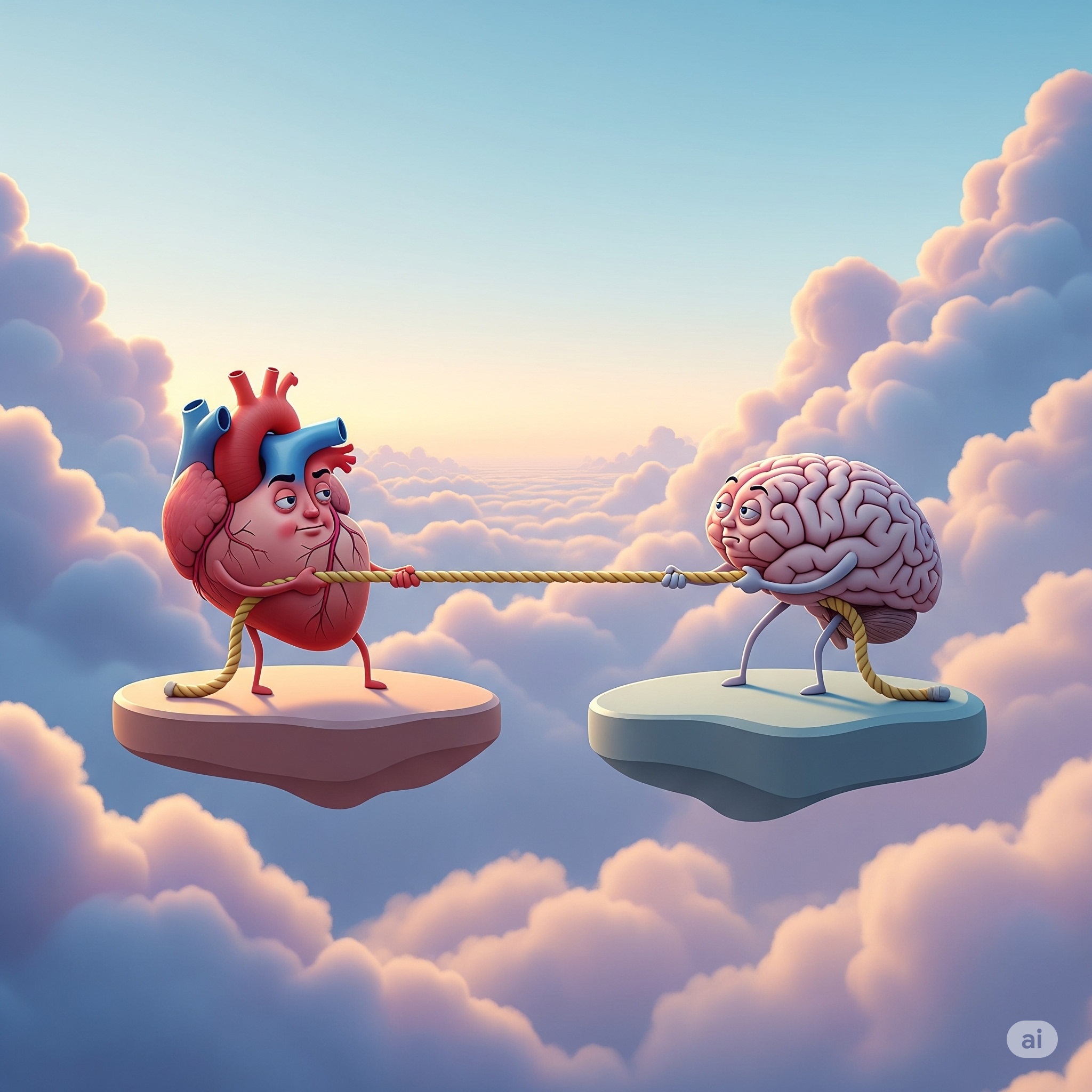
Write what you are looking for and press enter to begin your search!

Introduction
The corporate world is waking up to a harsh reality: robots are getting smarter, degrees are getting more expensive, and the skills that matter most can't be measured by traditional metrics. If you're considering bypassing the university route to fast-track your way into a graduate-level career, this article will reveal why emotional intelligence (EQ) might be your secret weapon. You'll discover what EQ really means, why it trumps IQ in the modern workplace, how to maintain confidence as a self-learner, and practical strategies for developing emotional intelligence even if you're starting from scratch. By the end, you'll understand why feeling good about yourself isn't just nice-to-have, it's essential for career success.
What exactly is EQ and Why is it Important?
Emotional Intelligence, or EQ, is your ability to recognize, understand, and manage emotions, both your own and others'. Unlike IQ, which measures cognitive ability and remains relatively fixed throughout your life, EQ is a learnable skill that encompasses four core competencies: self-awareness, self-management, social awareness, and relationship management.
Here's where it gets controversial: traditional education systems are factories for producing high-IQ, low-EQ graduates. Universities excel at teaching analytical thinking but fail spectacularly at developing the emotional skills that actually determine career success. Students emerge with impressive technical knowledge but struggle with basic workplace realities like handling criticism, managing stress, building relationships, or adapting to change.
The modern workplace doesn't just want human calculators, it needs emotional navigators. As artificial intelligence handles more routine cognitive tasks, the premium on uniquely human skills skyrockets. Machines can process data faster than any human, but they can't read a room, inspire a team during a crisis, or build trust with a difficult client. These emotionally intelligent behaviors are becoming the new currency of career advancement.
Consider this: Google's internal research revealed that their most successful teams weren't composed of the smartest individuals, but rather those with the highest collective emotional intelligence. The ability to create psychological safety, demonstrate empathy, and manage interpersonal dynamics proved more valuable than raw intellectual horsepower. This pattern repeats across industries, from healthcare to finance to technology.
For self-directed learners, EQ becomes even more critical. You're entering workplaces without the traditional credentials that signal competence. Your emotional intelligence becomes your calling card, it's how you demonstrate maturity, professionalism, and leadership potential that might otherwise be assumed from a degree.
IQ or EQ: Which Metric Has the Greatest Positive Effect on Performance and Well-being?
The answer might surprise you: while IQ gets you hired, EQ gets you promoted and keeps you sane.
Research consistently shows that EQ accounts for 58% of job performance across all industries. Once you reach a certain cognitive threshold—roughly an IQ of 120—additional intelligence points yield diminishing returns. Beyond this point, emotional intelligence becomes the primary differentiator between average and exceptional performers.
But here's the uncomfortable truth about IQ obsession: it creates emotionally stunted high achievers. Many academically successful individuals struggle with imposter syndrome, perfectionism, and social anxiety precisely because they've been conditioned to believe intelligence equals worth. They've spent years optimizing for test scores while neglecting emotional development, leaving them ill-equipped for the messy, unpredictable world of human interaction.
High-EQ individuals, conversely, demonstrate remarkable resilience and adaptability. They bounce back from failures faster, maintain better relationships, and experience lower levels of stress and burnout. They're also more innovative. Emotional intelligence facilitates the kind of creative collaboration that leads to breakthrough ideas.
The well-being component is crucial for self-learners. Traditional students have external structure, peer support, and clear milestones. Self-directed learners must generate their own motivation, navigate uncertainty, and maintain confidence without institutional validation. This requires significant emotional resources.
People with higher EQ experience greater life satisfaction, better physical health, and more fulfilling relationships. They're less likely to suffer from anxiety and depression, partly because they possess better coping mechanisms and stronger social support networks. For someone building a career outside traditional pathways, this emotional resilience isn't just helpful—it's essential for long-term success.

Why It's Essential to Feel Good About Yourself as a Self-Learner
Self-directed learning is fundamentally an emotional journey disguised as an intellectual pursuit. Your feelings about yourself directly impact your learning capacity, persistence, and ultimate success.
When you feel good about yourself, your brain operates in an optimal state for learning. Positive emotions broaden your thinking, increase creativity, and improve memory consolidation. Conversely, self-doubt and negative emotions narrow your focus, impair cognitive function, and trigger fight-or-flight responses that inhibit learning.
The challenge for self-learners is that you're constantly swimming against societal currents. Family members might question your choices, peers might seem to be following more conventional paths, and employers might initially be skeptical of non-traditional candidates. Without a robust sense of self-worth, these external pressures can derail your progress.
Feeling good about yourself also affects how others perceive you. Confidence is contagious, when you genuinely believe in your abilities and choices, others are more likely to believe in you too. This becomes crucial during job interviews, networking events, and workplace interactions where you need to compensate for the absence of traditional credentials through sheer presence and competence.
Moreover, self-directed learning requires enormous discipline and motivation. You must consistently choose difficult, growth-oriented activities over easier, more immediately gratifying alternatives. This sustained effort is only possible when you maintain a positive relationship with yourself and your goals.
The most successful self-learners develop what psychologists call "unconditional self-regard" that is ,they separate their worth as human beings from their performance or achievements. This allows them to take risks, make mistakes, and persist through difficulties without their self-esteem crashing.
What to Do When Starting from High IQ but Low EQ
If you're intellectually gifted but emotionally underdeveloped, you're not alone, and you're not doomed. Many brilliant individuals have successfully developed their emotional intelligence, but it requires acknowledging some uncomfortable truths and adopting new approaches to personal development.
First, recognize that intellectual arrogance might be your biggest obstacle. High-IQ individuals often dismiss emotional intelligence as "soft skills" or assume they can logic their way through interpersonal challenges. This mindset prevents the vulnerability and openness necessary for emotional growth. You must be willing to accept that you might be a beginner in this domain, regardless of your intellectual achievements elsewhere.
Start with radical self-awareness. Begin documenting your emotional patterns through journaling or mood tracking apps. Notice what triggers stress, anxiety, or irritation. Pay attention to how your emotions affect your behavior and decision-making. Many high-IQ individuals are surprisingly disconnected from their emotional experiences because they've learned to intellectualize rather than feel.
Practice emotional labeling with granularity. Instead of "I feel bad," try "I feel frustrated because my learning progress isn't matching my expectations, which triggers my perfectionism and makes me want to quit." This precise emotional vocabulary helps you understand and manage your internal experiences more effectively.
Develop your social observation skills through what I call "emotional anthropology." Start paying attention to the emotional dynamics in every interaction. Notice body language, tone of voice, and energy levels. Practice predicting how others might be feeling and check your accuracy when appropriate. This builds your social awareness muscle.

Work on your emotional regulation through proven techniques like meditation, deep breathing, or cognitive reframing. High-IQ individuals often excel at reframing once they learn the techniques, but they must first accept that managing emotions is a skill worth developing.
Seek feedback actively and regularly. Ask trusted friends, family members, or mentors about your emotional impact on others. This might be uncomfortable initially, but it provides invaluable data for improvement. Create safe spaces where people can be honest with you about your blind spots.
Finally, practice empathy deliberately. When someone shares a problem, resist the urge to immediately offer solutions. Instead, focus on understanding and acknowledging their emotional experience first. This simple shift can dramatically improve your relationships and professional interactions.
Conclusion
The future belongs to emotionally intelligent humans who can navigate complexity, build relationships, and adapt to change, skills that no artificial intelligence can replicate. For self-directed learners entering the workforce without traditional credentials, emotional intelligence isn't just an advantage; it's essential for career success and personal well-being.
We've explored how EQ encompasses self-awareness, self-management, social awareness, and relationship management which are all learnable skills that matter more than raw intelligence in determining career outcomes. While IQ might open doors, EQ keeps them open and creates new opportunities for advancement.
Feeling good about yourself as a self-learner isn't self-indulgent, it's strategically necessary. Positive emotions enhance learning capacity, build resilience, and create the confidence needed to succeed in non-traditional career paths. Even those starting with high IQ but low EQ can develop emotional intelligence through deliberate practice and genuine commitment to growth.
Key Takeaways for Your Self-Learning Journey:
1. Prioritize emotional intelligence development alongside technical skills, it's your competitive advantage against both traditional graduates and artificial intelligence.
2. Maintain unconditional self-regard, separate your worth from your performance to sustain motivation through challenges.
3. Practice radical self-awareness, understand your emotional patterns to manage them effectively.
4. Develop granular emotional vocabulary, precise feeling words lead to better emotional management.
5. Seek feedback actively, other people's perspectives reveal blind spots crucial for growth.
6. Focus on empathy before solutions, understanding others' emotions builds stronger professional relationships.
7. Remember that EQ is learnable, unlike IQ, emotional intelligence improves with practice and intention.
The robots are coming for cognitive tasks, but they can't replicate human emotional intelligence. By developing your EQ while building technical competencies through self-directed learning, you're not just preparing for a career, you're future-proofing yourself for a world where emotional intelligence becomes the ultimate differentiator. The question isn't whether you're smart enough to compete; it's whether you're emotionally intelligent enough to thrive.
Yes https://topolakd.net
rsrd\jzfdnzfd vbfdxb
swfewqfv sht n
Accountability is key to growth, and sharing your journey publicly adds a whole...